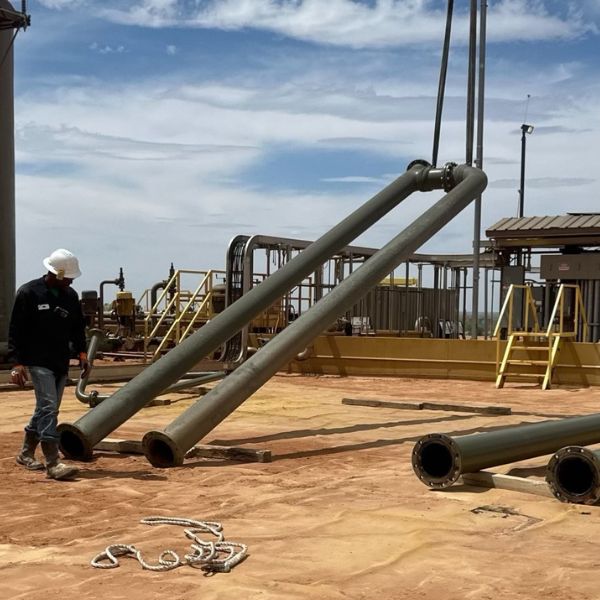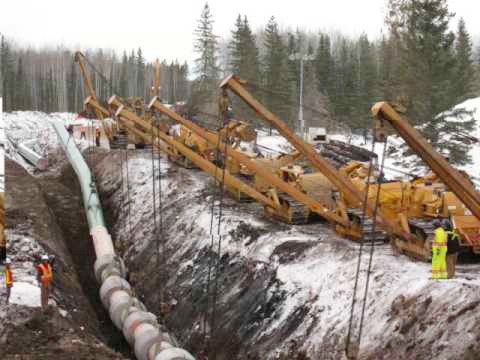How to Choose the Right Pipeline Construction Services for Your Infrastructure Project
Wiki Article
The Important Guide to Understanding Pipeline Construction Services and Their Value
Pipeline Construction services are basic to the transportation of essential sources such as water, gas, and oil. These solutions involve careful preparation and implementation, adhering to rigorous safety and ecological standards. As the market adapts to modern obstacles, understanding its implications and elements comes to be progressively vital. What aspects contribute to the growing value of these services in today's economic situation? The following areas will certainly explore these important facets.Overview of Pipeline Construction Solutions
Pipeline Construction solutions encompass a variety of tasks vital for the installment and upkeep of pipes used to move various substances, including water, oil, and gas. These solutions are essential for ensuring the reliable and secure activity of sources from one place to an additional. The procedure typically begins with extensive preparation and style, which thinks about regulative needs, ecological factors to consider, and logistical obstacles.Excavation and grading of the land are performed to prepare the website for Pipeline installation as soon as preparation is total. This is complied with by the real laying of the pipelines, which entails welding or signing up with sections together to produce a continuous circulation course. After setup, extensive testing is performed to assure honesty and safety. Maintenance solutions are likewise offered to address any issues that might emerge gradually. On the whole, Pipeline Construction services play an essential role in sustaining facilities for power and water distribution.
Key Parts of Pipeline Construction
An effective Pipeline Construction job depends on numerous crucial components that guarantee the reliable and risk-free installation of the Pipeline system. First, complete site assessments are critical, as they identify the environmental and geographical factors that may impact Construction. Next, the choice of appropriate materials, such as pipelines and installations, is crucial for safeguarding toughness and compatibility with the moved compounds.Progressed Construction techniques, including trenchless innovation and directional exploration, boost efficiency and minimize ecological influence. Effective project administration is one more crucial part, coordinating labor, devices, and timelines to fulfill project goals.
Furthermore, communication among stakeholders, consisting of designers, professionals, and local authorities, assurances positioning on job requirements and needs. Ultimately, comprehensive quality assurance measures throughout the Construction process make sure conformity with market standards and take full advantage of the Pipeline's operational lifespan. Collectively, these parts create the foundation of an effective Pipeline Construction project.
Safety Requirements and Rules in Pipeline Construction

Regulatory bodies, such as the Occupational Security and Health And Wellness Management (OSHA) and the Pipeline and Hazardous Products Security Management (PHMSA), stated particular requirements that govern Construction practices. These include protocols for tools use, worker training, and emergency situation action treatments. By applying these criteria, Construction firms not just secure their staff members yet likewise safe public count on. Ultimately, extensive security steps add to the long-term success of Pipeline tasks, guaranteeing they satisfy both operational and environmental assumptions.
Ecological Factors To Consider in Pipeline Projects

Ecological considerations are important to the planning and implementation of Pipeline projects. These tasks should assess possible influence on communities, water sources, and local wildlife. Performing detailed environmental impact analyses (EIAs) is crucial, allowing stakeholders to determine and minimize risks prior to Construction begins.
Securing delicate areas, such as marshes and environments, often requires carrying out particular style features or alternate transmitting to minimize disturbance. Furthermore, Pipeline drivers are entrusted with developing techniques for protecting against leakages and spills, which can have terrible impacts on the atmosphere.
Interaction with local neighborhoods is necessary, as public problems can cause task modifications that enhance environmental security. Conformity with regulations established by ecological firms assures that projects satisfy sustainability requirements, promoting a balance between infrastructure needs and ecological preservation. Ultimately, addressing environmental factors to consider not only safeguards nature but additionally advertises neighborhood trust fund and task stability.
The Role of Technology in Pipeline Construction
Technology plays an important function in contemporary Pipeline Construction, improving efficiency and accuracy. Advanced surveying strategies enable exact planning and implementation, decreasing ecological effect and project hold-ups. Furthermore, the integration of automation and robotics improves operations, lowering labor expenses and boosting security on Construction sites.Advanced Evaluating Methods
Advanced surveying methods play a crucial duty in the successful implementation of Pipeline Construction projects. These approaches leverage advanced modern technology to ensure accurate mapping and evaluation of the terrain where pipes will be mounted. Techniques such as Geographic Details Equipment (GIS), LiDAR (Light Detection and Ranging), and 3D modeling make it possible for engineers to imagine and examine the landscape, recognizing ecological problems and potential barriers. By utilizing these sophisticated devices, teams can improve precision ready and positioning, substantially decreasing the danger of mistakes during Construction. Furthermore, real-time information collection allows for immediate modifications and educated decision-making throughout the project lifecycle. Eventually, these checking innovations contribute to boosted efficiency, security, and sustainability in Pipeline Construction initiatives.Automation and Robotics

Economic Influence of Pipeline Facilities
Pipeline facilities plays a crucial function in shaping regional economic climates and assisting in trade. By providing a reputable means of transferring oil, gas, and various other assets, pipelines reduce transport expenses and boost supply chain effectiveness. This facilities attracts financial investment, stimulates work creation, and cultivates financial growth in bordering areas.Moreover, the Construction and maintenance of pipes contribute considerably to regional economic situations, creating various employment chances in various markets, from engineering to labor. The influx of work commonly causes boosted investing in local services, better reinforcing financial task.
In addition, pipes boost energy safety by making certain a stable supply of resources, which is essential for industrial operations and property demands. As areas come to be adjoined via Pipeline networks, they gain accessibility to more comprehensive markets, boosting competitiveness and economic resilience. The economic effect of Pipeline facilities is diverse, influencing both immediate local economies and broader regional development.
Future Fads in Pipeline Construction Providers
The future of Pipeline Construction solutions is progressing in like it response to technological developments, regulatory adjustments, and expanding environmental considerations. Technologies such as robotics and drones are simplifying assessment and maintenance processes, improving safety and performance. Automation is positioned to decrease labor costs and increase accuracy in Construction procedures. Additionally, the raising emphasis on sustainability is prompting companies to take on green products and practices, straightening with international efforts to lower carbon footprints.Regulative frameworks are additionally adjusting to deal with ecological impacts, promoting higher openness and responsibility in Pipeline tasks. Additionally, the combination of wise technologies, including real-time monitoring systems, is anticipated to enhance the dependability and efficiency of Pipeline networks. As energy needs change toward sustainable sources, Pipeline Construction solutions will likely see a surge in tasks associated to biofuels and hydrogen transport. On the whole, these patterns suggest a transformative duration for the Pipeline Construction industry, concentrated on innovation and sustainability.
Frequently Asked Inquiries
What Kinds of Pipelines Are Generally Constructed?
Numerous kinds of pipes are commonly constructed, consisting of oil, water, gas, and sewer pipes - Pipeline Construction Services. Each offers distinctive objectives, facilitating the transport of vital resources across regions while adhering to safety and ecological policiesJust how Long Does a Regular Pipeline Task Take?
The duration of a typical Pipeline task differs significantly, usually ranging from numerous months to a couple of years. Variables affecting this timeline consist of job complexity, governing authorizations, and environmental considerations that must be dealt with.That Manages Pipeline Construction Firms?
Pipeline Construction firms are managed by Click Here different federal, state, and local agencies, consisting of the Pipeline and Hazardous Products Safety Administration (PHMSA) and state utility payments, ensuring conformity with security and environmental requirements throughout the Construction process.What Prevail Products Utilized in Pipeline Construction?
Common products utilized in Pipeline Construction include steel, polyethylene, and PVC. Each product provides distinctive advantages such as durability, resistance, and versatility to deterioration, making them appropriate for numerous applications in delivering gases and fluids.
Exactly How Are Pipeline Construction Costs Approximated?
Pipeline Construction costs are approximated by evaluating elements such as material expenditures, labor rates, task complexity, ecological considerations, and regulatory demands (Pipeline Construction Services). Accurate price estimation warranties effective budgeting and project preparation throughout the Construction processPipeline Construction solutions encompass a variety of tasks necessary for the setup and upkeep of pipelines utilized to transfer different substances, including water, oil, and gas. An effective Pipeline Construction task relies on a number of vital parts that guarantee the reliable and secure installment of the Pipeline system. Advanced evaluating techniques play a crucial role in the successful execution of Pipeline Construction tasks. Numerous kinds of pipes are frequently created, consisting of oil, water, gas, and sewage pipes. Pipeline Construction prices are approximated by analyzing factors such as material costs, labor prices, job intricacy, ecological factors to consider, and governing needs.
Report this wiki page